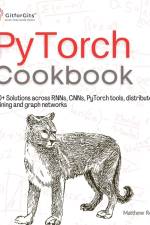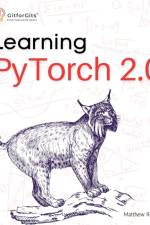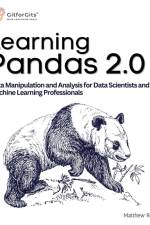von Matthew Rosch
67,00 €
Starting a PyTorch Developer and Deep Learning Engineer career? Check out this 'PyTorch Cookbook,' a comprehensive guide with essential recipes and solutions for PyTorch and the ecosystem. The book covers PyTorch deep learning development from beginner to expert in well-written chapters.The book simplifies neural networks, training, optimization, and deployment strategies chapter by chapter. The first part covers PyTorch basics, data preprocessing, tokenization, and vocabulary. Next, it builds CNN, RNN, Attentional Layers, and Graph Neural Networks. The book emphasizes distributed training, scalability, and multi-GPU training for real-world scenarios. Practical embedded systems, mobile development, and model compression solutions illuminate on-device AI applications. However, the book goes beyond code and algorithms. It also offers hands-on troubleshooting and debugging for end-to-end deep learning development. 'PyTorch Cookbook' covers data collection to deployment errors and provides detailed solutions to overcome them.This book integrates PyTorch with ONNX Runtime, PySyft, Pyro, Deep Graph Library (DGL), Fastai, and Ignite, showing you how to use them for your projects. This book covers real-time inferencing, cluster training, model serving, and cross-platform compatibility. You'll learn to code deep learning architectures, work with neural networks, and manage deep learning development stages. 'PyTorch Cookbook' is a complete manual that will help you become a confident PyTorch developer and a smart Deep Learning engineer. Its clear examples and practical advice make it a must-read for anyone looking to use PyTorch and advance in deep learning.Key LearningsComprehensive introduction to PyTorch, equipping readers with foundational skills for deep learning.Practical demonstrations of various neural networks, enhancing understanding through hands-on practice.Exploration of Graph Neural Networks (GNN), opening doors to cutting-edge research fields.In-depth insight into PyTorch tools and libraries, expanding capabilities beyond core functions.Step-by-step guidance on distributed training, enabling scalable deep learning and AI projects.Real-world application insights, bridging the gap between theoretical knowledge and practical execution.Focus on mobile and embedded development with PyTorch, leading to on-device AI.Emphasis on error handling and troubleshooting, preparing readers for real-world challenges.Advanced topics like real-time inferencing and model compression, providing future ready skill.Table of ContentIntroduction to PyTorch 2.0Deep Learning Building BlocksConvolutional Neural NetworksRecurrent Neural NetworksNatural Language ProcessingGraph Neural Networks (GNNs)Working with Popular PyTorch ToolsDistributed Training and ScalabilityMobile and Embedded Development



